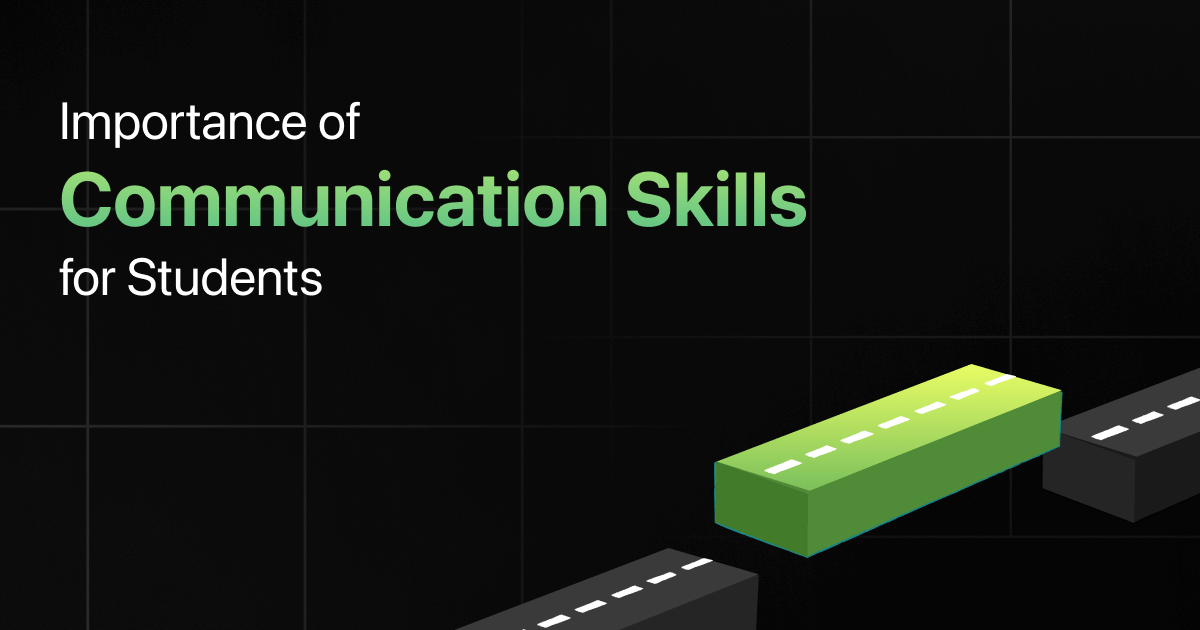Importance of Communication Skills for College Students

Are you aware of how important communication skills are in both a student’s academic and personal life?
The use of effective communication skills in a student’s life can’t be counted on finger tips . While mastering all kinds of communication is not only necessary for their personal well-being, it is also crucial in accomplishing their academic and professional pursuits by helping them flourish in their future jobs.
Today, we will look at the importance of communication skills for students and how it can impact their overall growth and development.
Importance of Communication Skills for College Students
The following are the importance of communication skills for college students:
1. Enhances Academic Performance
Excellent communication skills are critical for academic success since they are involved in all aspects of a student’s academic journey.
Strong communication skills are required to transmit thoughts and ideas effectively and coherently, whether engaging in class discussions or presenting presentations.
Students with great communication skills can participate in important discussions, ask important questions, and communicate their viewpoints clearly in the classroom. They can readily comprehend and follow directions, actively participate in group tasks, and collaborate with their peers.
Furthermore, children with strong communication skills are better able to absorb complicated subject matter and effectively convey their understanding to their professors and peers.
2. Improves Career Prospects
One of the most major advantages of having great communication skills for students is improved career prospects. Employers in today’s competitive employment market need employees who can successfully interact with clients, coworkers, and stakeholders.
Students with strong communication skills can differentiate themselves from their peers and have a better chance of finding their dream job.
Communication skills are required for careers in education, law, journalism, and a variety of other disciplines. Students who can successfully improve communication skills can develop their professions, create a strong network, and accomplish their career goals.
For example, in the healthcare professions, excellent communication is critical for patient care. To deliver quality care, doctors, nurses, and other healthcare workers must interact with patients, families, and other healthcare providers.
3. Encourages Effective Collaboration
Collaboration is critical to success in both academic and professional settings. Communication skills are crucial in developing successful student collaboration.
Students who can communicate clearly and effectively with their classmates and instructors can work effortlessly together, exchange ideas, and achieve common goals.
Students must interact efficiently with their teammates to thrive in extracurricular activities such as debates, theatre, and athletics.
For example, in a sports team, each member must communicate their roles and duties, tactics, and progress in order to win. Similarly, each team member in a debate tournament must successfully express their ideas and points of view to the audience and judges.
4. Fosters Leadership Qualities
A great leader must be able to clearly and clearly communicate their vision, ideas, and objectives to their team. This not only helps them win the confidence and respect of their team, but it also drives them to work together to achieve a common goal.
Students with great communication skills have a better chance of becoming effective leaders in the future.
Imagine a student is a president of a student council or the leader of a project group. In that scenario, they must successfully convey their ideas and plans to their team members. They can guarantee that their team is all on the same page and working towards the same objective by doing so.
And, if any issues arise, they need to be able to address them promptly and resolve them through effective communication.
5. Facilitates Conflict Resolution
Conflict is a natural part of human interaction, and it is unavoidable. When conflicts are not handled properly, they can have negative implications such as strained relationships, stress, and reduced productivity.
Communication skills are essential for conflict resolution because they allow students to communicate their viewpoints, understand the perspectives of others, and establish mutual understanding.
Imagine a group project in which there are conflicts among team members. Children with good communication skills can successfully explain their points of view, listen to others, and collaborate to achieve a common objective. They can pinpoint the source of the conflict and devise an agreement that works for everyone.
6. Builds Confidence and Self-Esteem
Students feel more confident and motivated when they can express their thoughts and ideas with clarity and accuracy. Students who have trouble communicating, however, could experience anxiety, unease, or reluctance, which might impede their ability to advance both professionally and personally.
For example, a student who delivers a well-organised and articulate argument during a class debate, is more likely to receive favourable comments and feel more confidence in their abilities.
Similarly, in a job interview, a student who can properly communicate their thoughts is more likely to create a good impression on the interviewer and boost their chances of landing the job.
A student who fails to communicate, on the other hand, might find it difficult to engage with classmates, make friends, or express oneself in social environments. Professors and parents can promote and support students’ communication skills development by providing constructive criticism, opportunities for practice, and positive reinforcement.
Frequently Asked Questions
1. What are communication skills?
Communication skills refer to the ability to convey and receive information effectively through various channels such as speaking, writing, listening, and body language. It involves expressing ideas and thoughts clearly, interpreting information accurately, and understanding others’ perspectives.
2. Why are communication skills important for students?
Effective communication skills are essential for students as it helps them excel in their academic pursuits, build meaningful relationships, and succeed in their future careers.
3. Is communication the most important skill in life?
While communication is a crucial skill, it is not the only skill that determines a person’s success in life. Other important skills such as critical thinking, problem-solving, adaptability, and creativity are equally essential for overall growth and development.
4. How to improve communication skills in college?
There are several ways or activities to improve communication skills in college, such as:
- Participate in group discussions and debates
- Practice active listening and empathetic communication
- Attend public speaking workshops and seminars
- Read books and articles to enhance vocabulary and language skills
- Seek feedback from peers and instructors
5. What are the best ways to improve communication skills?
Some effective ways to improve communication skills are:
- Practice, practice, practice
- Use simple and clear language
- Pay attention to non-verbal cues and body language
- Be an active listener
- Avoid distractions during conversations
- Be confident and assertive while communicating
- Seek feedback and work on improving weaknesses
Final Words
We hope this article has helped you understand the significance of communication skills for students. If you have the gift of communication, that’s brilliant. Even if you don’t, after understanding the importance of communication skills, you can refer to several YouTube channels, books, or games to work on your communication skills.
If you have any thoughts, suggestions, or questions, please feel free to share them in the comments section below. We would love to hear from you.
Related Posts


Best YouTube Channels to Improve Communication Skills
Are you struggling to effectively communicate with others? Do you want to improve your public speaking or presentation skills? Look …









